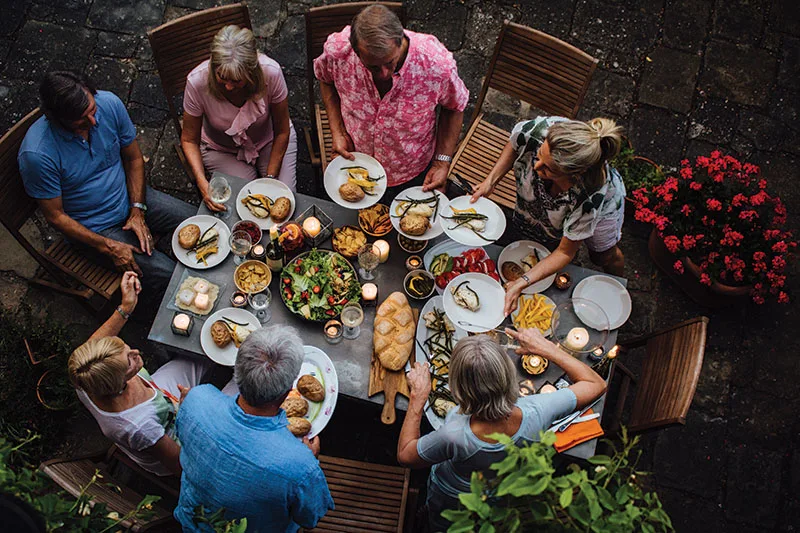How to Be Happier and Healthier:
Lessons from the Blue Zones
Written By: Madeline Cheney

The experiences I had last summer changed my life. I was fortunate enough to be able to travel around the globe and visit three of the top five areas in the world renowned for longevity: Sardinia, Italy; Ikaria, Greece; and Okinawa, Japan. These places are known as “blue zones” and have the highest concentrations of centenarians in the world.
There are many factors that make these places unique and contribute to the longevity of the people. For example, they eat a modest diet of 95% plant-based foods, which are especially full of health-promoting properties due to environmental conditions, and they hike rocky, mountainous terrain every day, simply to get from place to place. In fact, the level of the steepness of their hikes has even been attributed to being significant to their health.
In each blue zone I visited, I lived like the locals did. I hiked the rocky mountains of Sardinia with a shepherd, then hand-sheared a sheep at the top of that mountain, visited with a 104-year-old Sardinian woman in her home, danced with Ikarian locals at one of their traditional festivals, cooked traditional foods with locals in every location, met with their elders and listened to their stories and words of wisdom, stayed in the home of an Okinawan woman, and had many other unforgettable experiences. It took a lot of stamina, countless busses, subways, 16 hotels (including an overnight on a ferry), and 12 flights, but it was truly a whirlwind adventure I will never forget.
There are many lessons the blue zones offer, but one that stands out is the emphasis the people in blue zones place on maintaining a strong social support system. This emphasis has been proven, separate from their diet and physical fitness, to be significant in promoting health and happiness, even reducing stress. There are three main things the blue zone centenarians consistently do to achieve this:
BUILD MEANINGFUL RELATIONSHIPS
Even as a tourist, I was welcomed with warmth everywhere I went – it’s just part of each blue zone’s culture. At the festival I went to in Ikaria, I got disconnected from my group for a few moments and was immediately invited by an old Ikarian man to join his table and share his food and drink. I learned that in all of the blue zones I visited, once you meet someone, you’re basically friends for life. It was clearly evident that relationships are valued highly. Every day, people spend time visiting with friends and place great importance on that time. I also noted that each elder I met with mentioned that throughout their lives, they didn't hold grudges or have major conflicts with others. Not only did they develop good relationships, they didn’t allow negativity in relationships to fester.
BE THERE FOR OTHERS & LET OTHERS BE THERE FOR YOU
Maintaining reliable social support systems is essential not only for feeling connected but also for reducing stress. Knowing that you have people who will help you out whenever you need it makes potentially stressful situations manageable. In Okinawa, the women have extremely tight-knit groups of friends called “moai” that last throughout their lifetimes. In times of need, they will actually reach out to their moai instead of their family. These women get together frequently and not only help one another but are willing to admit when they need help and allow their moai to support them. The mentality of "looking out for number one" doesn't exist there, and they reap significant benefits because of it. Simply by being there for each other, they increase the quality of their lives.
HAVE GOALS, BUT BE READY TO ADAPT AS CIRCUMSTANCES CHANGE
Particularly in Ikaria, I learned the easy-going nature of the people. They have goals and work towards them, but when their path changes, they go with it. They believe that it was meant to be that way. They have a positive outlook on life and don’t let negativity and worries overwhelm them.
"Having people to rely on is vitally essential to wellbeing."Having the ability to stay positive and adapt may seem unrelated to social support, but the two are very connected. Without a strong system to rely on, the ability to cope with stressors is dramatically reduced. Along with other individual factors, the amount of social support that someone feels largely determines whether a potential stressor will be manageable and seem insignificant or will reach a level of stress that has negative effects. Having people to rely on is vitally essential to wellbeing.
In today’s world, being busy and stressed out is viewed positively, even admirably, as if you’re not working hard enough if you don’t feel constant stress. I am a strong advocate for setting goals and working hard, but we don’t need to feel the full weight of daily stressors if we rely on those around us as we strive to reach our goals. We all stand to benefit from following the lessons from the blue zone centenarians to be a little happier and healthier.
Prev Article